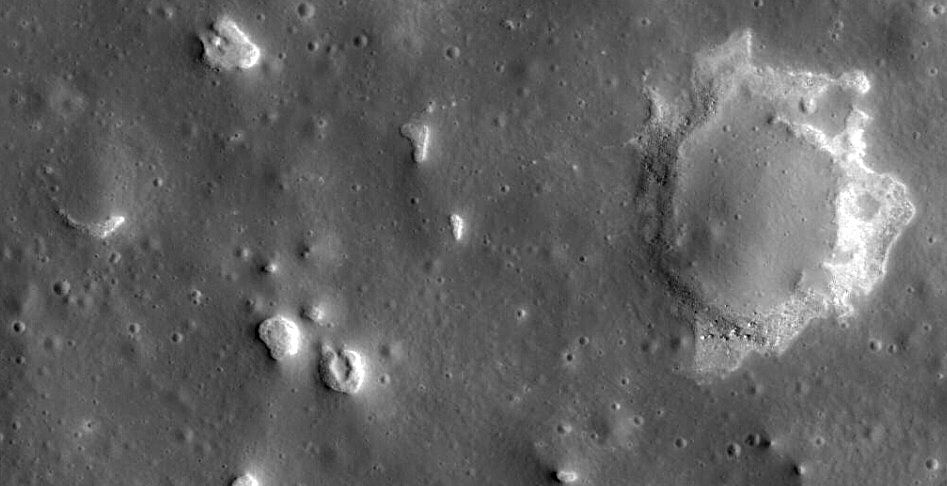Difference between revisions of "March 20, 2010"
| Line 3: | Line 3: | ||
<!-- ws:start:WikiTextHeadingRule:1:<h1> --> | <!-- ws:start:WikiTextHeadingRule:1:<h1> --> | ||
<!-- ws:start:WikiTextLocalImageRule:16:<img src="/file/view/LPOD-Mar20-10.jpg/128990257/LPOD-Mar20-10.jpg" alt="" title="" /> -->[[File:LPOD-Mar20-10.jpg|LPOD-Mar20-10.jpg]]<!-- ws:end:WikiTextLocalImageRule:16 --><br /> | <!-- ws:start:WikiTextLocalImageRule:16:<img src="/file/view/LPOD-Mar20-10.jpg/128990257/LPOD-Mar20-10.jpg" alt="" title="" /> -->[[File:LPOD-Mar20-10.jpg|LPOD-Mar20-10.jpg]]<!-- ws:end:WikiTextLocalImageRule:16 --><br /> | ||
| − | <em>LROC Observation M104476560L from [http://wms.lroc.asu.edu/lroc#damoon | + | <em>LROC Observation M104476560L from [http://wms.lroc.asu.edu/lroc#damoon LROC WMS Image Map] (illumination from the left)</em><br /> |
<br /> | <br /> | ||
| − | The peculiar depression [http://the-moon.wikispaces.com/Ina Ina] has a bizarre floor of [/February+3%2C+2010 rubbly hills and islands of smooth terrain]. Sorting through the LRO images released on March 15 I found this image of part of the floor of Hyginus crater that looks similar. The largest roughly circular feature is 350-400 m wide, but it is not clear what the feature is. Smaller circular to irregular depressions are across the scene. The arcuate depression on the left looks like it continues as a circular feature covered by the darker material. But if Hyginus is like Ina, the dark smooth material is as old as maria outside Hyginus, suggesting that it is not a younger deposit. Thus, it seems that something is removing the terrain under the original mare surface. Like Ina, Hyginus is thought to be a volcanic collapse depression. Perhaps volcanic gases dissolve the regolith in volcanic craters causing this characteristic pattern. But what gas would do this? Comparison with the 43 year old Orbiter V [http://www.lpi.usra.edu/resources/lunarorbiter/frame/?5095 | + | The peculiar depression [http://the-moon.wikispaces.com/Ina Ina] has a bizarre floor of [/February+3%2C+2010 rubbly hills and islands of smooth terrain]. Sorting through the LRO images released on March 15 I found this image of part of the floor of Hyginus crater that looks similar. The largest roughly circular feature is 350-400 m wide, but it is not clear what the feature is. Smaller circular to irregular depressions are across the scene. The arcuate depression on the left looks like it continues as a circular feature covered by the darker material. But if Hyginus is like Ina, the dark smooth material is as old as maria outside Hyginus, suggesting that it is not a younger deposit. Thus, it seems that something is removing the terrain under the original mare surface. Like Ina, Hyginus is thought to be a volcanic collapse depression. Perhaps volcanic gases dissolve the regolith in volcanic craters causing this characteristic pattern. But what gas would do this? Comparison with the 43 year old Orbiter V [http://www.lpi.usra.edu/resources/lunarorbiter/frame/?5095 image] reveals no obvious changes so the process does not appear to be active on a human timescale.<br /> |
<br /> | <br /> | ||
| − | <em>[mailto:tychocrater@yahoo.com | + | <em>[mailto:tychocrater@yahoo.com Chuck Wood]</em><br /> |
<br /> | <br /> | ||
<strong>Related Links</strong><br /> | <strong>Related Links</strong><br /> | ||
Rükl plate [http://the-moon.wikispaces.com/R%C3%BCkl+34 34]<br /> | Rükl plate [http://the-moon.wikispaces.com/R%C3%BCkl+34 34]<br /> | ||
| − | Note that Pete Schultz and colleagues included Hyginus as an Ina-like object in their 2006 [http://adsabs.harvard.edu/abs/2006Natur.444..184S | + | Note that Pete Schultz and colleagues included Hyginus as an Ina-like object in their 2006 [http://adsabs.harvard.edu/abs/2006Natur.444..184S paper].<br /> |
<br /> | <br /> | ||
<hr /> | <hr /> | ||
| − | <div>You can support LPOD when you buy any book from Amazon thru [http://www.lpod.org/?page_id=591 | + | <div>You can support LPOD when you buy any book from Amazon thru [http://www.lpod.org/?page_id=591 LPOD!]<br /> |
</div> | </div> | ||
---- | ---- | ||
===COMMENTS?=== | ===COMMENTS?=== | ||
| − | + | Register, and click on the <b>Discussion</b> tab at the top of the page. | |
Revision as of 17:17, 11 January 2015
Another Ina?

LROC Observation M104476560L from LROC WMS Image Map (illumination from the left)
The peculiar depression Ina has a bizarre floor of [/February+3%2C+2010 rubbly hills and islands of smooth terrain]. Sorting through the LRO images released on March 15 I found this image of part of the floor of Hyginus crater that looks similar. The largest roughly circular feature is 350-400 m wide, but it is not clear what the feature is. Smaller circular to irregular depressions are across the scene. The arcuate depression on the left looks like it continues as a circular feature covered by the darker material. But if Hyginus is like Ina, the dark smooth material is as old as maria outside Hyginus, suggesting that it is not a younger deposit. Thus, it seems that something is removing the terrain under the original mare surface. Like Ina, Hyginus is thought to be a volcanic collapse depression. Perhaps volcanic gases dissolve the regolith in volcanic craters causing this characteristic pattern. But what gas would do this? Comparison with the 43 year old Orbiter V image reveals no obvious changes so the process does not appear to be active on a human timescale.
Chuck Wood
Related Links
Rükl plate 34
Note that Pete Schultz and colleagues included Hyginus as an Ina-like object in their 2006 paper.
COMMENTS?
Register, and click on the Discussion tab at the top of the page.



